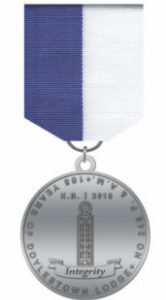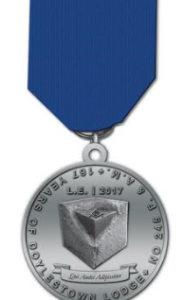Netflix has started streaming availability of “Inside the Freemasons,” the five-part documentary shown in England on Sky1 network during the United Grand Lodge of England’s 300th anniversary celebration last year. The program was that rarest of television treatments of the fraternity – calm, even-handed, truthful – and features numerous Masons throughout England discussing their membership. It was created with the cooperation of the grand lodge
Doylestown Historical Society
A history of the building that is now the Masonic Lodge on State Street, courtesy of research conducted by Brother Milt Kenin of the Doylestown Historical Society:
Blood Drive 2018
This year we will be holding our annual blood drive on Thursday, May 17th from 2:00pm until 7:00pm. I see this program as vital, but under appreciated and decided that I would take a short break from more Masonic articles in my newsletter to spend a few minutes highlighting this lifesaving club. Small note, if you attended any of the leadership programs offered this year you probably sat through a 30-45-minute presentation on the Masonic Blood and Organ Club, so this short letter should be a relief.
Friday the 13th
As we approach our April Stated Meeting I was searching for a Friday the 13th themed article to make light of the date (of course Lou lucked out with two Friday the 13th meetings last year!) but was less than entertained with what I could find. However, I did stumble across an interesting read about a Masonic conspiracy from 1723 that I wanted to touch on briefly in this month’s newsletter. To be fair, there are a few articles written about this topic that go into better detail, but I’m limited by time and space.
In London there was an article posted in a local paper, The Flying Post, which was claimed to be the first published Masonic catechism and is referred to as “A Mason’s Examination” by R.F. Gould in his book History of Freemasonry. This specific article was printed in the April 11-13, 1723 edition (the paper was only printed a few times a week instead of daily, hence the span in dates) and prompted a response from the community. A second and similar article appeared shortly after this in The Post Boy December 26-28, 1723 edition and was referred to as a “sham exposure” of Masonic ritual.
The World’s First Grand Lodge
The world’s first Grand Lodge – looking back to where it all started
Three hundred years ago, in a room in a pub, history was made. Were it possible to travel in time, it would be fascinating to bring back the brethren who came together at the Goose and Gridiron alehouse in London on 24 June 1717, when they elected the first Grand Master and brought into being the first Grand Lodge in the world, writes John Hamill, Director of Special Projects for the United Grand Lodge of England (UGLE).
According to James Anderson in the 1738 Constitutions of the Free-Masons, four lodges met at the alehouse in St Paul’s Churchyard. Named after the public houses where they usually met, the lodges were Goose and Gridiron Ale-house in St Paul’s Church-yard; the Crown Ale-house in Parker’s Lane off Drury Lane; the Apple-Tree Tavern in Charles Street, Covent Garden; and the Rummer and Grapes Tavern in Channel Row, Westminster.
Freemasonry in the news (The Economist)
The Economist explains
What is freemasonry?
Misinformation and conspiracy abound. Is it a benign organization or one bent on subverting government?
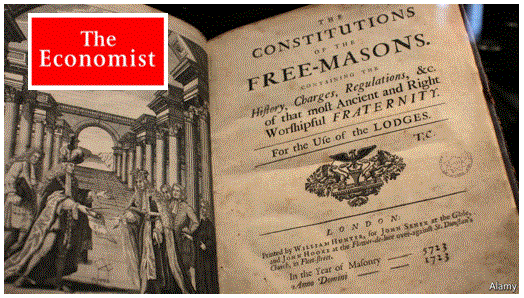
Published Feb 27, 2018
The literature on freemasonry does not offer straightforward explanations. Is it benign or bent on subverting government? Is it a community of knowledge or of the occult? Such questions are not new. Since its development in the 18th century, freemasonry has drawn the ire of the Catholic church, right-wing politicians and, more recently, Britain’s Home Office. (Fearing that masons in the police and judiciary were giving preferential treatment to other masons, the Home Office between 1998 and 2009 required judicial appointees to disclose their membership.) Freemasonry can appear incomprehensible because it contains no coherent ideology or doctrine, and is defined instead by a commitment to universal brotherhood and self-improvement. Nor does a single governing body exist. It is made up of a loose network of groups, known as lodges, that fall under regional and national grand lodges. What, then, is freemasonry all about?Read more“Freemasonry in the news (The Economist)”
The Dog Ate My Homework
There are many sayings that we use daily, perhaps without knowing the meaning or history behind the phrases. Sayings such as “giving them the third degree,” “blackballed,” and to a lesser extent “being hoodwinked” are examples of phrases which we’ve all heard, and are quick to note a Masonic reference behind the saying. I won’t be going into more depth on those sayings because I’d like to propose a new phrase that has been used for a significant length of time, and I would argue has a Masonic origin, “my dog ate my homework.”Read more“The Dog Ate My Homework”
2018 Scholarships Now Available
The Doylestown Masonic Lodge annually awards scholarships of $500 to graduating high school seniors from local schools who have been involved in community activities including volunteer service and have demonstrated a dedication to their high school academic experience.
About the Master’s Medal 2018
168 Years of Doylestown Lodge. Embossed in the center is a representation of the Plumb, a well-known Masonic symbol representing “integrity.” As a Mason, we are taught to stand tall and walk uprightly before God and Man. The ribbon is blue and white, and while the color blue is frequently associated with integrity, the combination of blue and white is also used to promote the ideas of knowledge and charity.
167th Banquet
The 167th Anniversary Annual Banquet will be held on Wednesday, October 25, 2017 at the Doylestown Country Club.
Social Hour – Hors D’oeuvres – Cash Bar
6:00 pm – 7:00 pm
Dinner Buffet and Program
7:00 pm – 10:00 pm
Dinner entrées include: Carved Roast Beef & Turkey, Salmon and vegetable Farfalle
Hors D’oeuvres, dinner salad, dessert, coffee & tea are also included.
Please RSVP by October 13, 2017
2nd Annual District Cigar-B-Que Scheduled
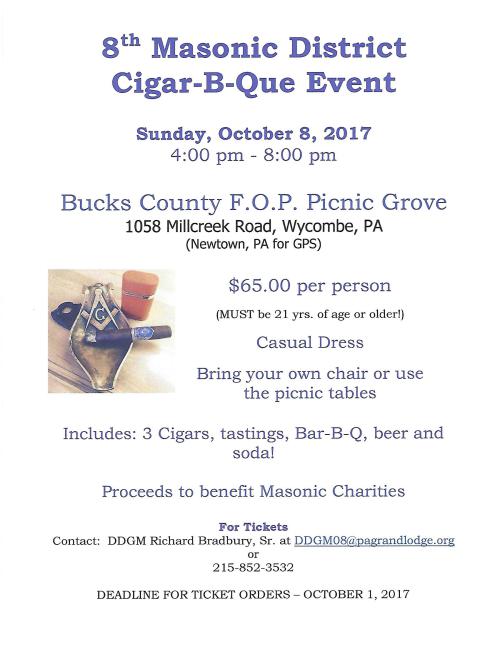
To Register for the event, please download and complete the order form below:
Cigar-B-Que Ticket Order Form 2017
London Freemasons donate £2M to new London Air Ambulance
London Freemasons have donated £2 million pounds towards the ‘Your London, Your Helicopter’ campaign of London’s Air Ambulance. The aim of the second helicopter is to extend daylight flying hours, thus providing an even more effective emergency service to London. The second helicopter was launched on the 28th January 2016. Graham Hodgkin, CEO of London’s Air Ambulance, said “We are blown away by the generosity of London Freemasons which brings us significantly closer to our aim of having a second emergency medical helicopter up and running by this summer. For many years, London Freemasons have been regular supporters of our work and we thank all those Freemasons across the Metropolitan area who will be working tirelessly to raise the two million pounds.”
The Freemasons’ fund-raising campaign kicked off with the presentation of a cheque for £250,000 at Freemasons’ Hall on Thursday, 5th March 2015 to Neil Jeffers, Chief Pilot of LAA, by the then Metropolitan Grand Master, Russell J. Race, DL. Russell Race commented, “Freemasons both in London and all over the country have been donating to Air Ambulances for many years. We at the Metropolitan Grand Lodge of London are delighted however to have an opportunity to specifically assist in the provision of this vital second helicopter for London.”
This first installment was followed by a further £750,000, which was handed over by Sir Michael Snyder, the new Metropolitan Grand Master, on Thursday 5th November 2015.
On 22 March 2017, a terrorist attack took place in the vicinity of the Palace of Westminster in London, seat of the British Parliament. The attacker drove a car into pedestrians on the pavement along the south side of Westminster Bridge and Bridge Street, injuring more than 50 people, four of them fatally. The helicopters were deployed to airlift the injured to multiple hospitals.
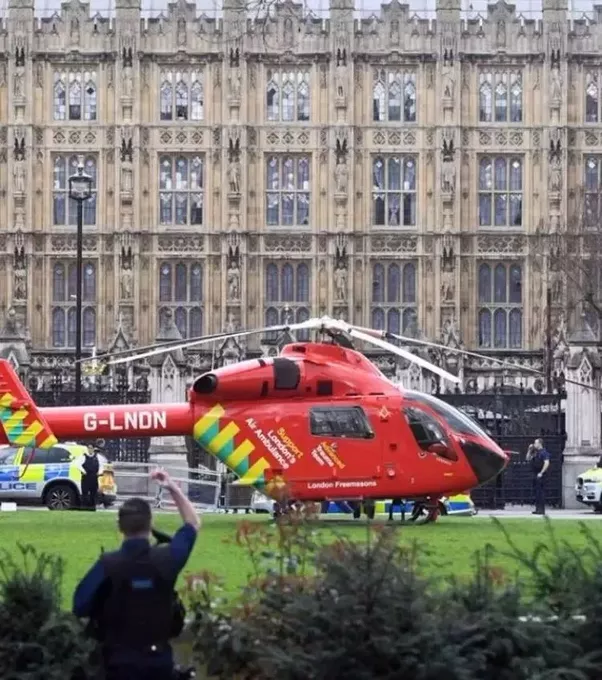
2017 Scholarships Available
<The period for application submission has now expired. Scholarship Recipients will be notified on May 8th via email.>
The Doylestown Masonic Lodge annually awards scholarships of $500 to graduating high school seniors from local schools who have been involved in community activities including volunteer service and have demonstrated a dedication to their high school academic experience.
The Importance of Ritual
As we all know ritual is an important aspect of Freemasonry, what we may not pay attention to is the importance it also has on our daily lives. We engage in ritualistic behaviors from the time we wake up until we go to bed. We typically refer to these as habits, but they are no less ritualistic than the work we do within the lodge on any given degree night. The question is: have we lost the importance of ritual, or have we just forgotten it?
About the Master’s Medal 2017
The 2017 Medal commemorates 167 Years of Doylestown Lodge. Embossed in the center is a representation of the rough and perfect Ashlar. The Ashlar is a Masonic symbol representing the making of stone from rough to smooth and better able for to be used by the builders. It represents the notion of becoming a member of the fraternity and contributing to its unity. In the spirit of the Blue Lodge, the ribbon is solid blue.
The Bohemian Club
The Bohemian Club is a private gentlemen’s club located in San Francisco, California. Founded in 1872 from a regular meeting of local journalists, artists, and musicians, it soon began to accept businessmen, entrepreneurs, university presidents, and military commanders.
The Eisenhower Method
Thanksgiving is the busiest time of the year for travel. Before things get too hectic over the holidays, now is the time to make the decisions that will help you manage your time wisely. And since we’re in November, let’s add a twist of Veterans Day into the mix.
Royal Order of the Red Branch of Eri
Legend says that the Royal Order of the Red Branch of Eri was founded in 1697 BC by the King of Ireland, back in a time when Ireland possessed highly developed literature. An ancient book entitled The Annals of the Four Masters of Ireland tells of the Knights of the Collar of Eri as instituted by King Eamhium and his eight princes over the armies of the four provinces of Ireland, i.e.: Ulster, Munster, Leinster and Connaught.

